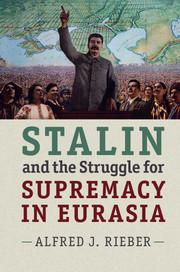Book contents
- Frontmatter
- Dedication
- Contents
- List of maps
- Acknowledgments
- List of abbreviations
- Introduction
- 1 Stalin, man of the borderlands
- 2 Borderlands in Civil War and Intervention
- 3 The borderland thesis: the west
- 4 The borderland thesis: the east
- 5 Stalin in command
- 6 Borderlands on the eve
- 7 Civil wars in the borderlands
- 8 War aims: the outer perimeter
- 9 War aims: the inner perimeter
- 10 Friendly governments: the outer perimeter
- Conclusion: A transient hegemony
- Index
8 - War aims: the outer perimeter
Published online by Cambridge University Press: 05 September 2015
- Frontmatter
- Dedication
- Contents
- List of maps
- Acknowledgments
- List of abbreviations
- Introduction
- 1 Stalin, man of the borderlands
- 2 Borderlands in Civil War and Intervention
- 3 The borderland thesis: the west
- 4 The borderland thesis: the east
- 5 Stalin in command
- 6 Borderlands on the eve
- 7 Civil wars in the borderlands
- 8 War aims: the outer perimeter
- 9 War aims: the inner perimeter
- 10 Friendly governments: the outer perimeter
- Conclusion: A transient hegemony
- Index
Summary
There is no evidence that Stalin had a master plan in mind for the political future of the borderlands in postwar Eurasia beyond the new Soviet frontier. If he had one, or even the elements of one, he did not share them with any of his colleagues in the leading organs of the party or military: in other words the individuals who would have to carry out such a plan. As more documentary evidence becomes available, it becomes clearer that throughout the war he had not made up his mind about a number of questions, including the pace and extent of the socioeconomic transformation of the postwar regimes within the states liberated by the Red Army; there is evidence that he changed his mind about some, such as the Soviet occupation zone in Germany. Although these conclusions are still debated, the following pages will attempt to demonstrate their validity.
Despite the absence of a master plan, Stalin's policies can be explained as an application of his borderland thesis within two distinctive but interconnected spatial dimensions or fields of operation. Let us call them the inner and outer perimeters. The inner perimeter refers to the territories lying within the operational sphere of the Red Army and the outer perimeter to the sphere of Anglo-American military operations. In both, the military commanders assumed special administrative powers during the liberation. There was no formal agreement on this de-limitation, although Stalin referred at least once to such a separation of responsibilities. The boundary between them resembled a frontier zone; it was initially blurred and porous, even on occasion disputed. Stalin's tacit acceptance of this separation reflected his estimate of the Soviet needs arising from the German invasion and the threatening presence of a militarist and expansionist Japan. He responded by entering into an unprecedented military and political alliance with the leading democratic capitalist powers in order to win the war and obtain guarantees of Soviet security and stability in the postwar period. For Stalin a successful outcome of the war would involve an extension of the wartime alliance in order to prolong the flow of economic aid for the reconstruction of the shattered Soviet economy, prevent the rapid recovery of a strong Germany and Japan, and gain Allied acquiescence in Soviet hegemony over the Eurasian borderlands.
- Type
- Chapter
- Information
- Stalin and the Struggle for Supremacy in Eurasia , pp. 283 - 321Publisher: Cambridge University PressPrint publication year: 2015



